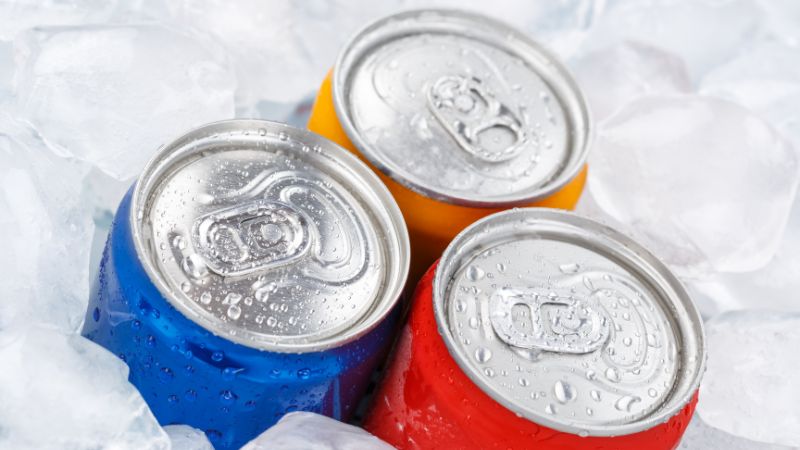Sugar-sweetened beverages, such as soft drinks, are quietly eroding our health due to their excessive calorie content and lack of essential nutrients. Regular consumption of sugary drinks not only leads to uncontrolled weight gain but also increases the risk of serious illnesses such as obesity, diabetes, cardiovascular disease, cancer, and tooth decay.
1 Do soft drinks have any nutritional value?
According to the Harvard T.H. Chan School of Public Health, sugar-sweetened beverages include soft drinks or any drink with added sugars or artificial sweeteners. Worryingly, these drinks are the unhealthiest type as they provide excess calories while lacking essential nutrients.
Many people mistakenly believe that drinking soft drinks will make them feel full like eating food. However, this is completely wrong. The calories from soft drinks do not make you feel full, nor are they efficiently burned by the body, leading to the risk of fat accumulation and uncontrolled weight gain.
Moreover, just one can of soft drink contains calories equivalent to a snack, ranging from 130 to 180 calories. This excess calorie, if not burned, will turn into fat, increasing the risk of type 2 diabetes, cardiovascular disease, cancer, and even early death.
 Do soft drinks have any nutritional value?
Do soft drinks have any nutritional value?
2 What diseases are associated with excessive soft drink consumption?
Diabetes
Added sugars, commonly found in processed foods, candies, and especially soft drinks, are silently threatening our health. Unlike natural sugars, added sugars are rapidly absorbed by the body, causing a sudden spike in blood sugar levels, forcing the pancreas to produce more insulin.
When the pancreas cannot keep up, the excess sugar accumulates, leading to the risk of diabetes and insulin resistance.
Increased risk and difficulty in controlling chronic diseases
In addition to diabetes, the consumption of added sugars, especially from soft drinks, is a contributing factor to a range of other health issues such as chronic inflammation, oxidative stress, obesity, cardiovascular diseases, hypertension, osteoporosis, liver disease, and even cancer.
For children, excessive soft drink consumption not only impacts their growth and development by interfering with calcium absorption but also increases the risk of obesity and future health problems.
 What diseases are associated with excessive soft drink consumption?
What diseases are associated with excessive soft drink consumption?
Accelerated aging
The harm of added sugars doesn’t stop there. Consuming too much sugar not only leads to uncontrolled weight gain but also accelerates the aging process. Collagen and elastin, the two main components that make up our skin, are damaged by excess sugar, resulting in early wrinkles, sagging skin, and a loss of youthful appearance.
Furthermore, people who regularly consume sugary drinks are at a higher risk of dermatological issues, particularly moderate to severe acne. Over time, the skin may develop dark spots, discoloration, and increased pigmentation, making one look older and less attractive.
Impact on male fertility
In 2021, a scientific study in the United States revealed a concerning link between soft drink consumption and male fertility. The research, conducted on nearly 3,000 young men, found that those who drank 220ml of soft drinks daily had an average decrease of 28 million sperm compared to the group who did not consume soft drinks. Additionally, male hormones also showed a significant decline in the group that regularly consumed soft drinks.
This discovery sounded an alarm about the potential harm of soft drinks to male reproductive health.
3 How can we consume soft drinks safely?
Soft drinks, despite their appealing colors and flavors, pose various health risks. However, due to their convenience and widespread popularity, they remain a favorite choice for many. So, how can we indulge in these drinks while safeguarding our health?
Choose safe products
-
Prioritize purchasing soft drinks from large, reputable stores or supermarkets to ensure their origin and quality.
-
Avoid buying soft drinks sold at roadside stalls or school gates as they are more likely to be counterfeit or of inferior quality, directly affecting your health.
-
Carefully check the expiration date, labels, and ingredients before buying. Opt for products with clear origins and safe, healthy ingredients.
 How can we consume soft drinks safely?
How can we consume soft drinks safely?
Limit your intake
-
Monitor your sugar intake: The recommended daily sugar intake for adults is 25g. Keep track of the sugar content in each can/bottle of soft drink to adjust your consumption accordingly.
-
Combine with water: Instead of solely drinking soft drinks, pair them with water to detoxify your body and minimize the harmful effects of sugar.
-
Listen to your body: Drink soft drinks only when you’re truly thirsty, and avoid forcing yourself or drinking out of habit.
4 How much soft drink is too much?
According to health experts, to protect our health, we should minimize the consumption of sugar-sweetened beverages, including carbonated and non-carbonated soft drinks, fruit/vegetable juices, energy drinks, sports drinks, and ready-to-drink teas/coffees. Especially, children under two years old should not consume any sugar-sweetened beverages at all.
For children and adolescents, the recommended intake of sugar-sweetened beverages is no more than 235ml per week, as suggested by the American Heart Association.
The reason for this recommendation is that just one 300ml can of soft drink provides us with the full daily recommended amount of free sugars (single and double sugars). Not to mention, we also get sugar from other food sources, leading to an even higher intake of free sugars, negatively impacting our health.
According to Dr. Nguyen Trong Hung, from the National Institute of Nutrition, the recommended daily intake of free sugars (single and double sugars) for a healthy adult is less than 10% of the total energy intake (equivalent to less than 50g of free sugars for a 2,000-calorie diet).
 How much soft drink is too much?
How much soft drink is too much?
Soft drinks offer delightful flavors and instant refreshment, but they also harbor potential health risks. Excessive consumption can lead to severe health issues such as obesity, diabetes, cardiovascular problems, and accelerated aging. Therefore, make smart choices to protect yourself and your loved ones!
Source: Sức khỏe và Đời sống Newspaper
What You Need to Know About Chocolate
Despite its tasty flavor, there are long-standing concerns that eating too much chocolate may lead to weight gain and tooth decay. Despite this, chocolate continues to be a popular indulgence during holidays and a meaningful gift to share with loved ones. It is also a popular ingredient for beauty treatments.



































